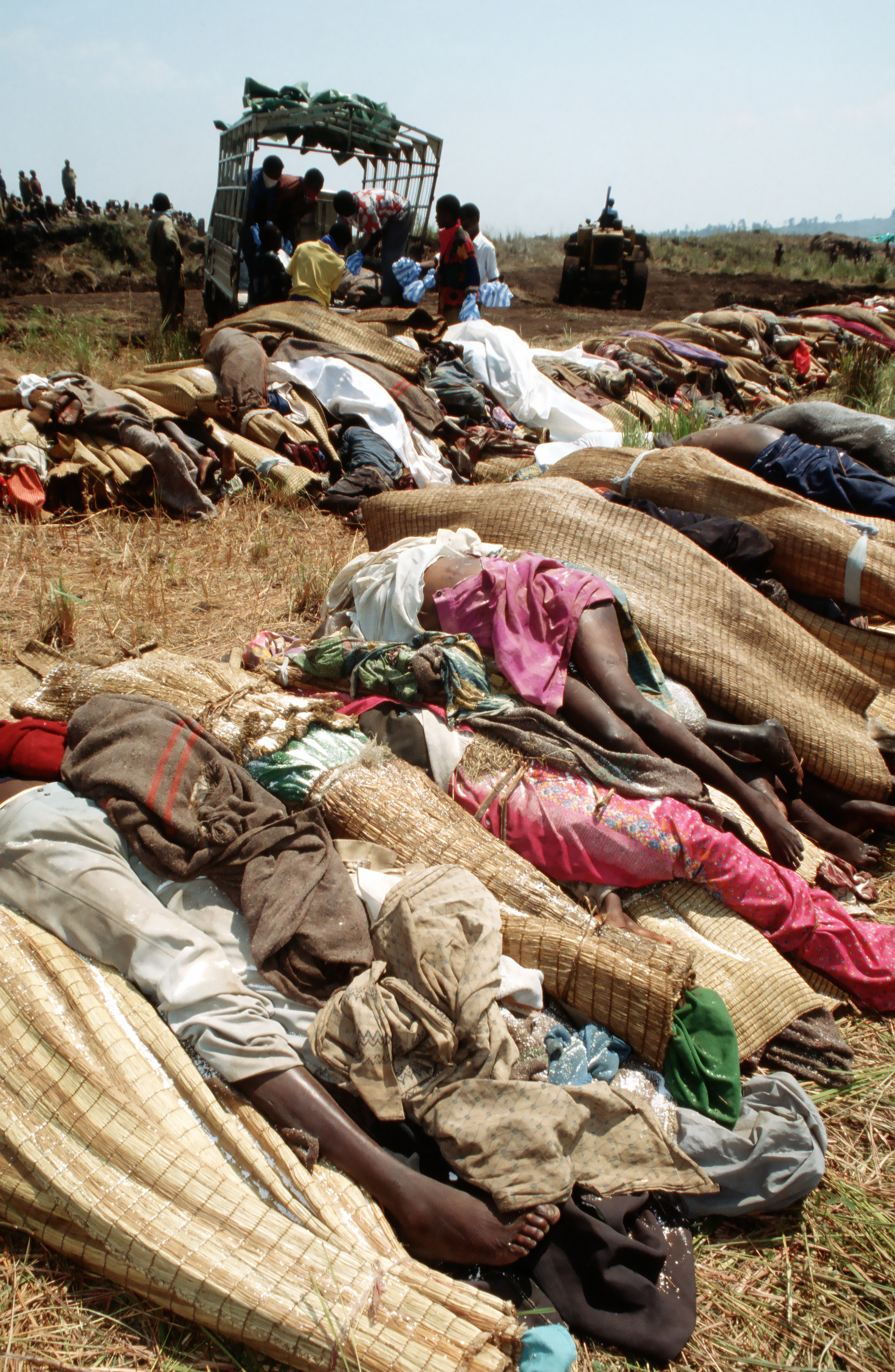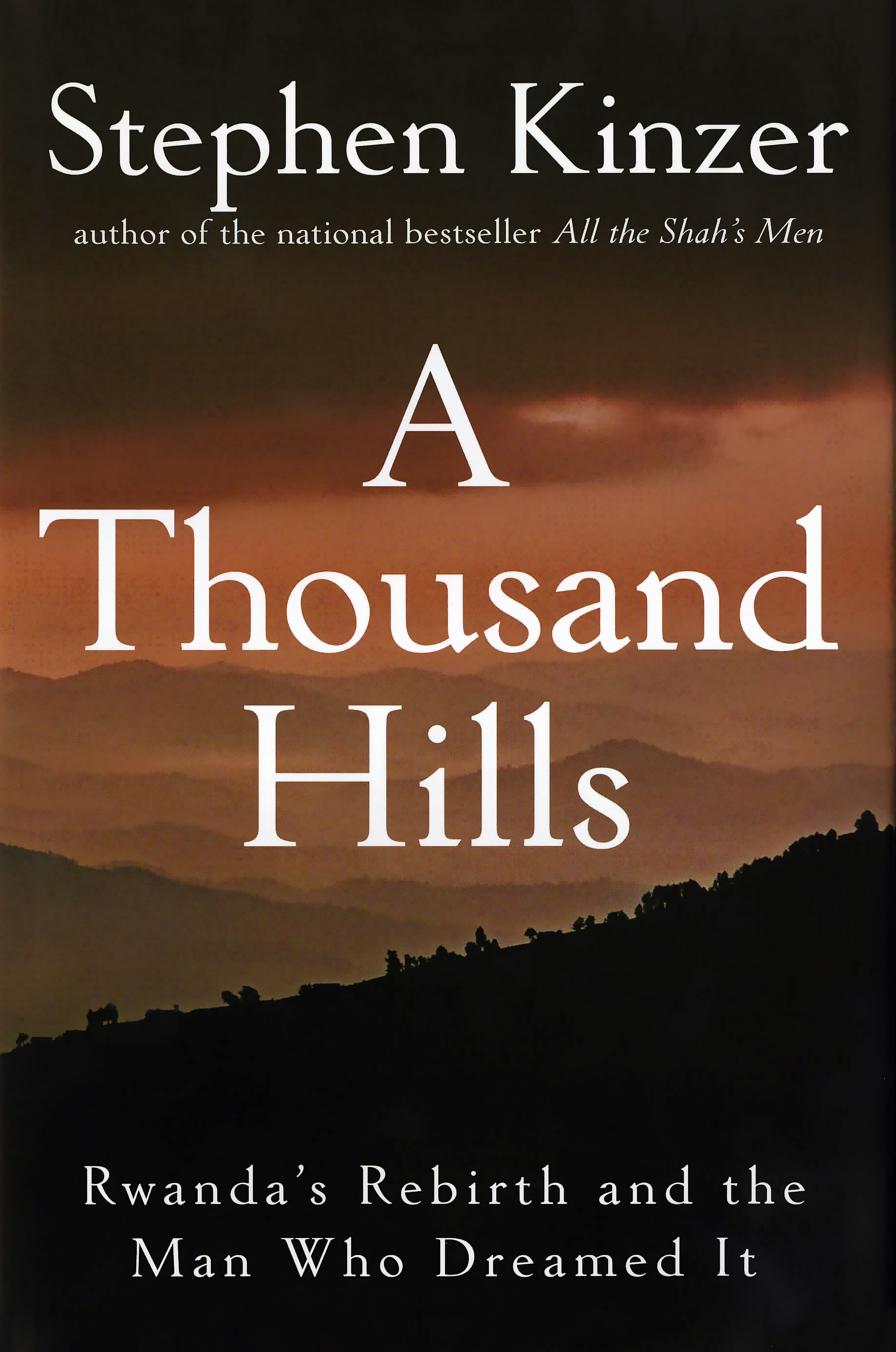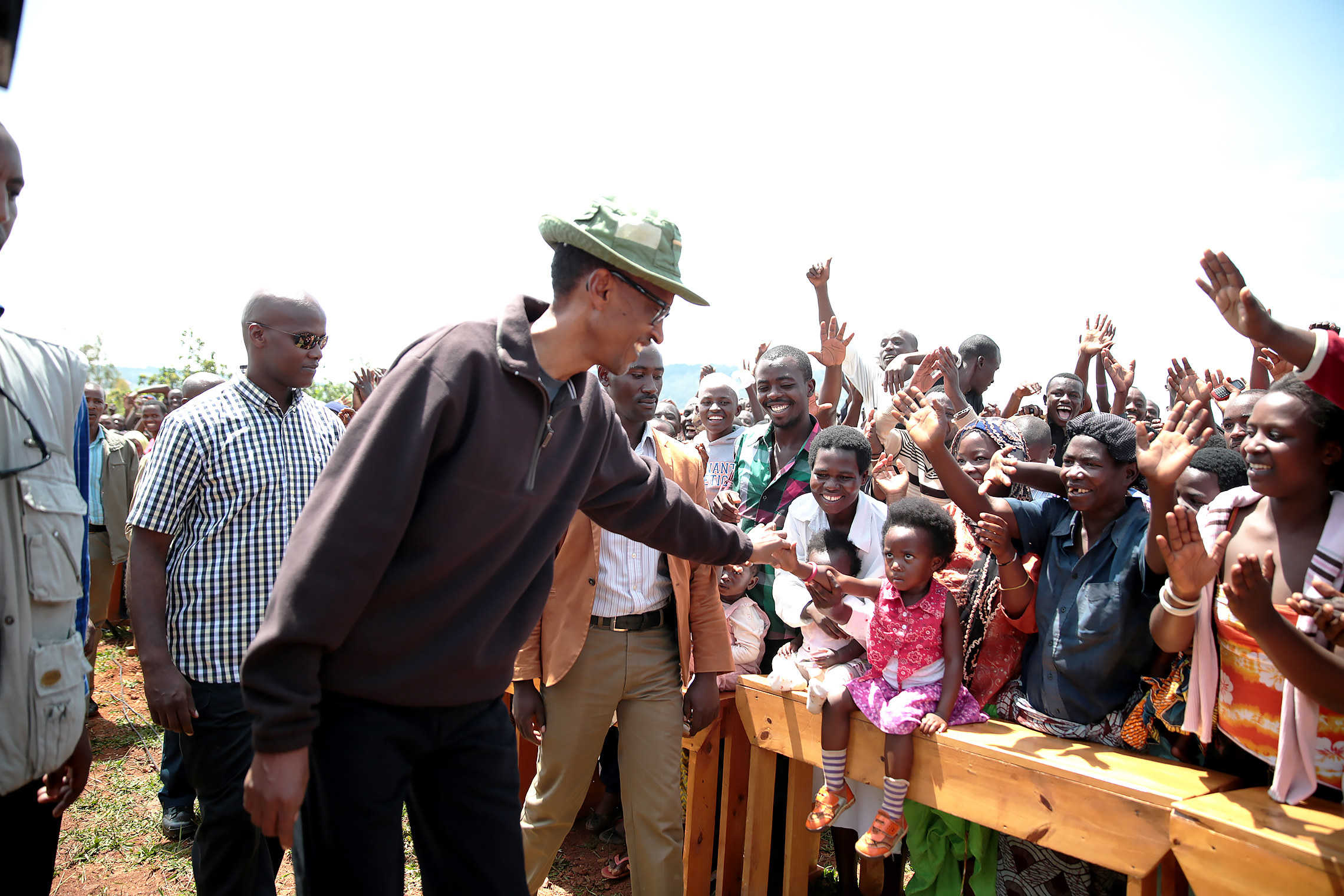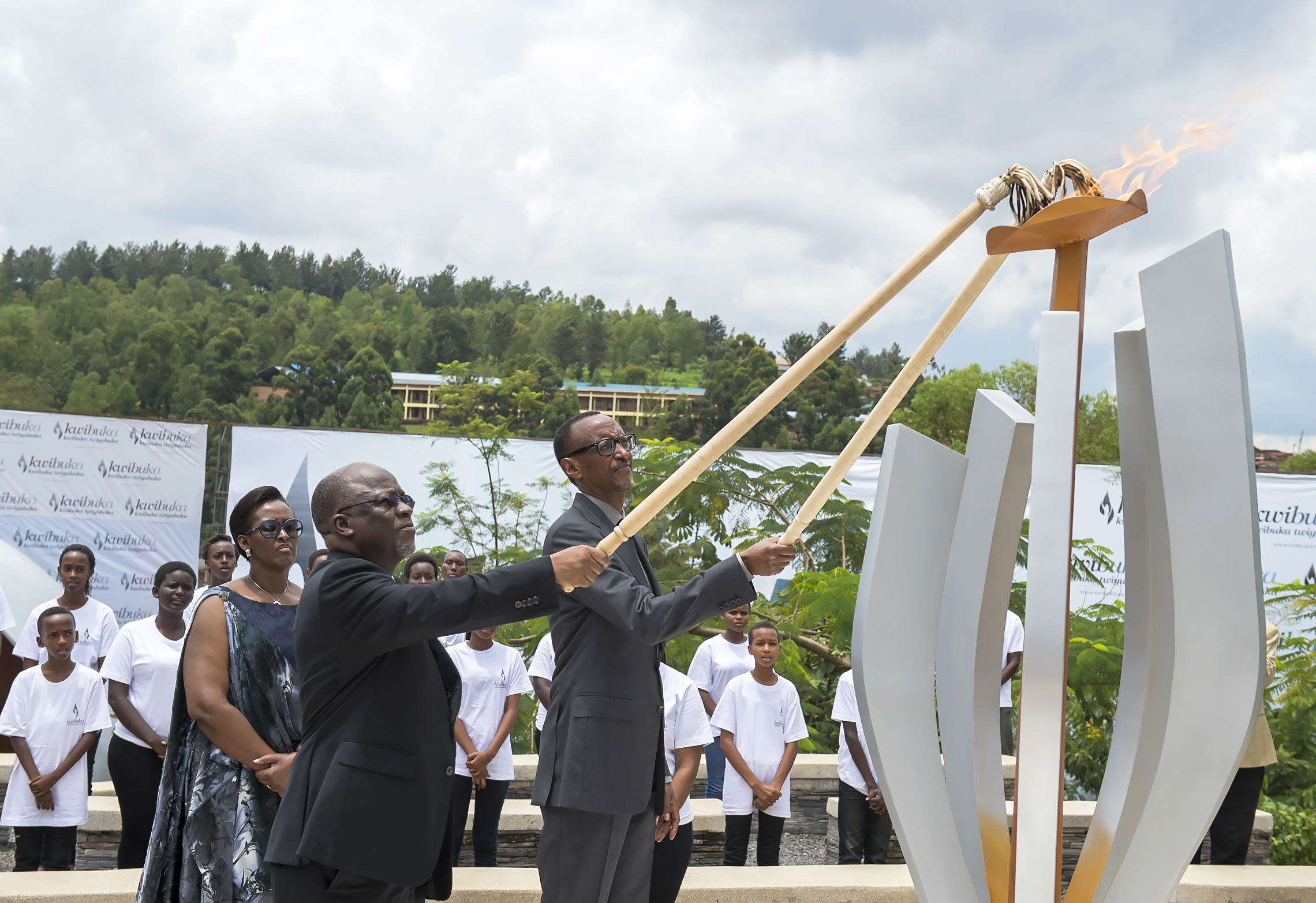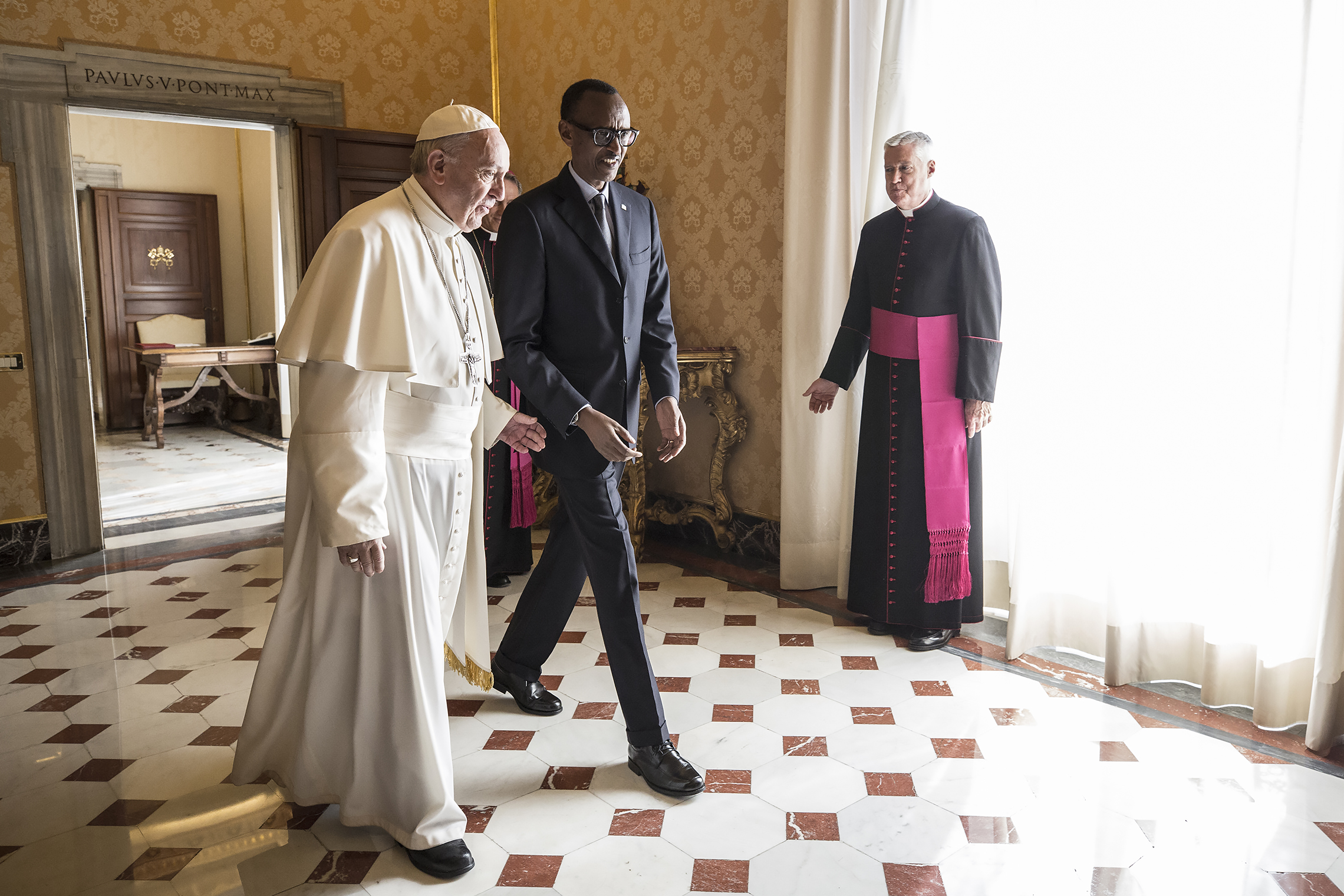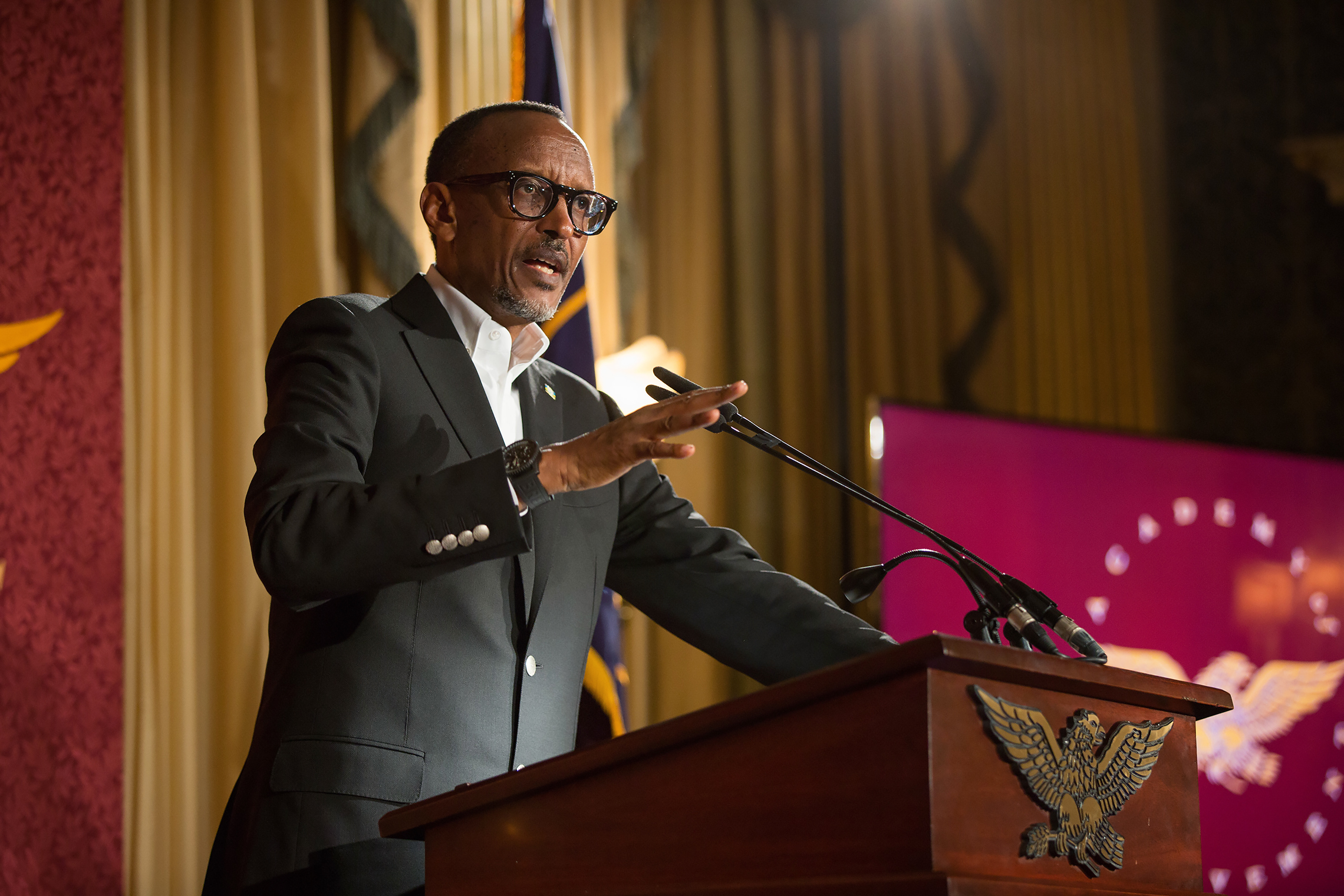We’d love to know more about your journey and how you came to leave the country you were born in.
Paul Kagame: From the earliest part of my life — close to four years old — that’s when my family went into exile. That was around ‘61. That’s when we became refugees in Uganda, lived in a refugee camp. Camps shifted. We went to different parts of Uganda as refugees, but life was the same to us living in a refugee camp. Of course, that was very difficult from whatever angle we look at it. Family, myself, and others, many other Rwandans, had to go into exile at the time. So the growing end of those conditions was quite an experience that shaped people, their thinking, and even later on, it was both physical and many things.
What was the hardest part about the refugee years?
Paul Kagame: I was a refugee for 25 years almost. The first part — 15, 20 years — were difficult. There’s no question about it. The conditions under which we lived, whether it was feeding the family or going to school, and we used to move on foot, distances, and covering about 10 kilometers, sometimes more, back and forth. So every aspect of life was complicated.
What was your first job?
Paul Kagame: Well, my first job actually ended up — so to speak — my first job being in the military, because I started getting involved in, I don’t know how to say, whether it is politics or the business of the struggle when I was 20 years old in Uganda. I go to Burundi, and the struggles in Uganda. In fact, I got involved in the armed struggle in Uganda from ‘81 to the end of 1985. Then I became a member of the military, the army in Uganda, from ‘86 to 1990.
During that period, when you were four to when you joined the army, did you have an influential teacher? Was there somebody who really made an impression on you?
Paul Kagame: Those conditions started shaping my thinking, or the thinking of those who were in that kind of condition, and that’s how, in the end, we came to join the Ugandan army. It’s complicated, in a sense, because we were refugees in Uganda. Then later on Uganda had changes. There was Obote, then Amin overthrew him. Then later on Amin was removed from power, and then these different struggles affected us.
What do you mean by the conditions that shaped you?
Paul Kagame: When you’re a refugee, you are stateless. You don’t belong anywhere. You’re just under that, and of course, in the end, directly and indirectly, you are affected. For example, at school we’re known as refugees and sometimes for anything that happened, anyone finds it easy to say, “It’s because of these refugees or non-citizens who were part of it.” You need paper to work. If they have no job they think the refugees have taken their place in the job market, or all kinds of critics happened. In fact, not just to me personally, but to everyone who was in that category. There are always stories about that.
I’ll tell you, I remember in 1977, ‘78, I had wanted to be — for some reason I had a liking for airplanes. I wanted to become maybe a pilot or an aircraft engineer or something. That was the reason in my mind. So I went for competition when they call people to —they were recruiting pilots for what existed as the East African Airways, but it was in Uganda, part of it. So I went there and did the exams, and I was actually one of the few who passed the exams from so many. They were aptitude tests carried out, and mathematics, physics.
So I passed that, and so when they called those who had passed the exams to report and — so when I arrived at a place, someone looked at me and just by my features, I think, he could tell that I am Rwandese, therefore — not the Rwandese of Ugandan citizenship — but the refugee. So he asked for my identity card. I gave it, and he cross-checked, found I was the one who had actually passed, and said, “What are you doing here?” I said, “Well, I came and did exams, and now I’ve just reported, like you called me to report.” So the person was very angry with me, almost kicking me out of the door of the room, and said, “You don’t belong here. You’re not Ugandan.”
What were you thinking at that time?
Paul Kagame: At that time, I think the thinking was more or less blurred by anger, so to speak. The fellow almost tore my identity card, but it was a school identity card, and so he said, “Get out of here,” so I was hesitating and said, “Why? Why are you treating me like this?” And the guy stood up and was charging at me. So I walked out, and from that time, for a long time, it never stopped ringing in my mind that this kind of situation is something one doesn’t need to experience in their lives, but it was with me. And I could imagine it was the same with many of my colleagues who were in other places. So I never forgot that moment.
That moment when you felt such utter discrimination — and later, when you were running a country, is there anything that you did or did not do because you remembered that ringing in your head?
Paul Kagame: Oh, yes. I think it had a huge impact on my life and different experiences in my life, or even in making decisions. First, I understood firsthand the problems of being a refugee. Second, it occurred to me nobody needed to experience that kind of thing. Three, I thought whatever I would be doing, whatever my responsibilities would involve, I would always try and find a way of addressing that problem, even for other people. In fact, later on, so many years after, in my position of responsibility, my country is one that treats refugees from other countries — we have many of them, from Burundi, from the DRC, that’s Congo, from different parts — we try as much to treat them very fairly. In fact, we have, as I just said to them, if they want to become citizens of our country, we will be happy to use our laws to make them so.
So if they prefer to stay like that because they maybe hope and want to go back to their countries, still it’s okay. We have given them pieces of land. They enjoy education like our own citizens. They even get employment, and there’s no such a thing as discriminating against them as refugees. It has a relationship with what happened to me as well, decades ago.
Take us back to your education. Did you really learn outside, under a tree?
Paul Kagame: Oh, yeah. When I was studying primary education, I think for the first three years we were studying under a tree. Not only were we studying under a tree, it was ridiculous because we used to write on our thighs. We didn’t have exercise books. We had no pens. We used to use dry pieces of grass, or something hard, to learn to write on our thighs, and you would carry your thigh to the teacher to show how… Later on we upgraded when we started getting something — like sometimes we would be offered by a friend, a relative — a Bic. We would use banana leaves — green, so you can write on them. We used to use banana leaves to write notes and do things. And, of course, there were no classrooms. We would be under tree, indeed. We used to pass our days like that, and sometimes getting a meal, one meal a day, was difficult. We would study and go home. So it was a bit difficult, but we went through all that.
Was there anyone in particular when you were young who told you to keep reading and keep learning?
Paul Kagame: My family, both my father and my mother, were very good at that, and they always — even under those conditions — they would always remind us how you thought about this, how you are thinking about school. “You must study.” It was every day instruction, almost. If we were leaving home, going to school, it’s like, “Make sure…” And for me, of course — I used to think parents were harder on me than my siblings because they used to get reports back from school that I was stubborn.
I was — you know, sometimes I’m out of class playing football when others were studying, but what used to save me was that for all those years I was always on top of my class. But still, my parents would sometimes not be forgiving. When they learned from the teachers that I was very stubborn and involved in petty fights with colleagues and very naughty at school, they would still really not be very kind to me.
Today your self-discipline is very well known. How did you learn that?
Paul Kagame: Discipline also came from my parents. I think I outgrew my stubbornness and being chicken and naughty around with kids, my age mates. So then, of course, as I was growing under these conditions, as we said, and being affected by them and being angry at — just that happening to me and others, and even my family and my parents, as I was seeing it, and always wondering what we needed to do. I think that became a transition to switching from just the usual routine of being the child that everyone wants to be.
We’ve read that you don’t drink. Do you exercise a lot? What are your daily discipline habits?
Paul Kagame: Now I do exercise. I do workouts. The alcohol I drink today, sometimes I take a sip of wine or things when the environment affects that, for dinners. It’s more or less to fit in with the environment, but long before that I wasn’t drinking. I never drank alcohol or smoked. No. Though my father was a very heavy smoker, and I think probably it’s part of what took his life. He used to smoke heavily.
What do you think makes you such an effective leader?
Paul Kagame: I think it must be a combination of two things. Must be these conditions under which I grew, and then my parents demanding that — they always insisted you have discipline, all of us children. I was born in a family of six children. I was the youngest, and discipline, respect for people, and even respect for ourselves, they really emphasized that a lot, and I think that stuck. There’s no question about it. I got a big dose of it from that environment, from my parents, what they emphasized. Sometimes I would go off track and wasn’t fitting in with the demands they were making, but that doesn’t mean it wasn’t having an effect on me.
It absolutely — maybe I was absorbing it even without realizing. So when I grew up, I could see that had an impact. But two things, I think, it’s always going to be the conditions maybe under which one grows, the environment, the conditions and so on, but the other part is the nature, in the end, the personality that one can’t claim one is responsible for. Sometimes it’s just in you. As they say, it’s nature and nurture that really combine to shape us. So I think I got a big dose of that myself.
How did you come to study at Fort Leavenworth?
Paul Kagame: First, I’m in Uganda. I’m the army in Uganda. I was at the rank of a major in the army, and in fact the position at Fort Leavenworth was meant for somebody else, and something happened. The government or the commander-in-chief or the commander of the army in Uganda changed their mind at the last minute and decided that I was the one to go, so I wasn’t even given time to prepare. I think it was, like, I was informed on a Friday, and I was being told to leave on a Tuesday next week, so I had only the weekend. But being in the institution where I was used to taking orders, and you know, there was no questioning, so I just — they asked me, “Are you ready?” I said, “I’m ready.”
I took a plane, went through Kenya — Nairobi — and flew. I remember experience, I think, I had a stop before I went Fort Leavenworth in Chicago, the airport, that’s where I landed, and it was, like, a place I had never imagined to be, and so — and I was alone, so I was finding my way, and, you know, later on reached Kansas, at Fort Leavenworth, so I was received very well. The environment is also good, but I found there other officers who had come from different countries, even on the continent, from Senegal, from Nigeria, from Kenya. There was one from Malawi and so on, so I immediately connected with them, so it was easy for me to cope, but then studies, there was no problem.
Even though you were there for only a brief time, is there anything in that experience that you still think about?
Paul Kagame: Yes, there was. I was doing a lot of reading, you know, military science. It’s about tactics; it’s about strategy. I thought it was very interesting for me, given what we had gone through in the years fighting wars in Uganda and the experience, the environment. I think it was coming together quite well, I think. Some of the things I had just experienced, but could not interpret or relate very easily with the actual sense or the art behind it, I was able to do that in the few months I was there, because I was there I think only for five months.
You left rather quickly.
Paul Kagame: Yes, because I started there in June. Then by October, that’s when the war started in Rwanda. Before I left, we had already been planning things, and by the time I left I knew what was going on. We communicated with the people in Uganda, on the ground. So I was following almost on a regular basis, and even at the time the war started in Rwanda, I was briefed. And so I left, knowing that at a certain point when it starts, I wasn’t sure of the date — because even others they left behind weren’t sure they were to act on it — which would be the best timing. But when the best timing was identified, I was informed. So all along I was to leave college and join when things started, when the fighting started, so that’s what I did.
What was your role at that point?
Paul Kagame: My role was linked with what I used to be even in the organization before. Before in the organization, before I left for Fort Leavenworth, there are no formal positions as such. We avoided that so that it doesn’t end up in the wrong place, but we had a way of communicating among ourselves, but I was one of the top three at the time. We had, so to speak, also maybe a number two. There was somebody that was senior to me who had started from the beginning, and when the war started, I was supposed to come and join anyway, not bothered by which position I’m holding or anything. That one we would figure out when we reached the ground.
So the leader, that one who was heading us — he was our commander. He was the head of the organization, the Rwandese Patriotic Front, but was also the commander of the forces — was actually killed on the second day of the invasion in Rwanda. So the army — the insurgents, the fighters — remained without a leader, but that is the time I was also planning to leave Fort Leavenworth. Naturally, what was expected on the ground was that since the first leader was killed, I was coming to take over.
Weren’t you worried that you’d be killed when you went back?
Paul Kagame: It’s funny, because in those moments, you are not really thinking about what is going to happen to you. The body and mind were so charged about doing something that you weren’t bothered with what is likely to happen, that could happen.
So what was in your mind when you were heading back?
Paul Kagame: My mind was, one, I was going to join the activities that were there, that had started around the struggle, and I wasn’t bothered about what position or what I was going to hold. I wasn’t even thinking about what could easily happen to me, like it had happened to others, because already the commander had been killed.
A lot of human rights groups have raised issues recently that it’s dangerous to be your political opponent. That some of the rivals or people that could unseat you end up dead or in jail. Are you a dictator or an authoritarian leader, as they say?
Paul Kagame: We have had studies going on by human rights groups, some people in the media, and so on and so forth. But if fairness was part of this life we lead and across the board in the world, one, it should have been clear long ago that there are lots of contradictions, serious contradictions in these studies peddled by human rights groups and others. Contradictions. Open contradictions. There is nothing that has been happening in Rwanda that suggests a situation of dictatorship, of violation of human rights or gagging the press or anything, really, the last decade, the last 23 years.
To say that everything else is fine, is going well, is good progress almost in everything, except this, I think in a way we just leave it to look ridiculous on its own without even us… and what you concentrate on is doing things so that the results tell the story. Other than the results themselves, the other people who can tell this story are the people of Rwanda. What is so unfortunate is that the human rights groups and some people in the media can… I mean, they dare to tell Rwandans — the majority of them, the biggest majority of them — that they are wrong in what they are doing or in the choices they make.
To dare tell people that, “You are wrong in your choices.” You’ve got to explain, who are you? Who are you who are saying, “You Rwandans are making a mistake.” Let me say it this way. We had elections recently. Seven million people went for elections, and the majority of them — meaning 98 percent of 7 million — made this free, open choice. Where they had come from up to that point, they made elections. And they said it openly, publicly. And even put to test of expressing it secretly, because publicly you can say, “Oh, maybe there’s influence and there’s pressure, there’s force.“ But secretly people will tell you the truth. And secretly, the secret ballot by those inside the country and outside, because you have people outside also voting, and the pattern remains the same.
When people from other countries hear that one side wins 98 percent of the vote, they may think there’s no room for opposition. What do you say when people who might be opponents end up in jail or injured?
Paul Kagame: Room for opposition is there. That’s why there’s at least two percent, and the two percent is not in prison, but I think also, this is where the problem now has come. It’s what we started talking about in our discussion, in the story of Rwanda. Does that matter? Does that create a context? From where we started in ‘60s, colonial times, and da-da-da, division, and then the genocide and so on. Does this matter to anyone, to any observer from outside, so that they are able to put all this in a context and therefore see this as a result of that? If we just want to look at it on its own, so like, there’s an election in Rwanda, so it should happen like it happens anywhere, like it happens in America, in UK, in France. By the way, some of the happenings there are also not being so clear to me in those places!
Do you get tired of other countries imposing their standards on your country?
Paul Kagame: I don’t even bother about it. I’m not tired because it doesn’t really matter so much in the lives of Rwandans. I’m so bothered about what matters to lives in our country, of our people. Those are the stories from the West, which is messed up by itself! So I’m just struggling with my own situation — people in Africa, people in Rwanda, struggling with our situations that have a completely different context.
What do you hope to accomplish in the next seven years?
Paul Kagame: We’ve unified the country, more or less erased this ugly history of division and that even led to genocide and hatred and so on, and solved political, social, and economic problems of our country and united the country. So we now need to keep concentrating on how do we lead our country to prosperity? How do we enable Rwandans to realize their own aspirations, their ideals, themselves being a part of it? And how do we allow this to happen without actually contradicting now some of the things people talk about out of context? Out of context, because people talk about Rwanda. “There is progress, there are nice things, good governance…” Then they end up with “but.” But what? That “but” should not be there because it is what even Rwandans are saying. It’s not me saying it, by the way. In fact, even it’s being said and realized by people from outside, other than these human rights organizations or the media. The ordinary people of the whole world — the Americans, ordinary people from America, whether it is business or other — when they come to Rwanda, or Europeans, they can’t except admire what has been done, what has been achieved in such short years. And by the way, these are people who really relate to ordinary people in Rwanda. They talk to them. They stay with them. They employ them. So they know the story, and they simply understand completely different from what these stories are in the media and with the human right groups.
Do you have a plan for succession? You have been such a central figure, leading your country out of one of the worst things that’s happened in the world. How do you see the succession after Paul Kagame?
Paul Kagame: It is going to happen, and it could happen in a stable way — and it will happen sooner or later.
You know, irrespective of what the accusations are against us, against me, or what anybody — it will happen. What should I say? But why should the people be fixated on it in the first place? The people of Rwanda are writing their own story. They are, you know, living their own lives in the manner they have chosen. That doesn’t and shouldn’t offend anyone. But for them, this country has suffered. They are working out a way to live their lives just like any other people in this world, and somebody keeps saying, “No, no. When is this one going?“ How does this become part of the story and the lives people of Rwanda want to live?
Are you worried that with all you’ve built in the country, that it is still somewhat fragile?
Paul Kagame: No. Rwanda is not fragile. It is being made fragile by these busybodies, you know? These people who want to manage our politics. That’s what would make it fragile. If we allow people from nowhere or from everywhere to dictate to a nation, to tell people how they should live their lives, that makes it fragile. But I would be a fool if, for all that passion I have contributed to and done with my people — every day what is being done or happening — we don’t factor in that which will give us the more stable future. I would be a fool, and for anyone to really be more worried about it than I am, I think just doesn’t make sense!
This is what I tell to these people. They keep coming and saying, “No, no, no.” They keep — these so-called prophets of doom — it’s like, “Tomorrow is going to crash!” And they really come with so many worries and suggestions. But I think people should be humble enough to say, “You know, these people, where they have come from, where they are now, maybe they know what they are doing.” I think people should give us —meaning the whole country and the people of Rwanda — some benefit of the doubt. First of all, we mean well for ourselves. We are the first learners of our own mistakes, if we have made any, and we are the ones interested the more in our future.
You’ve made enormous economic gains that are the envy of most of the continent. What’s the cornerstone of that? Is it the investment in education?
Paul Kagame: Almost everything starts and ends with people, involving people, investing in our people. It has been the key. This is why I’m saying that progress, whether economic or social, political, hasn’t been happening by accident. It’s because of the people of Rwanda who have come together. Therefore the short thing for Rwanda’s future starts with investing in our people, and that is education, and then we mind their health. So education has been the key, but it’s education to improve this person, the Rwandan, the people, so that they’re able to move.
Do you like Twitter?
Paul Kagame: Well, I’m on Twitter. Not necessarily that I like it, but I’m there! I think there may be that difference. But I’m on Twitter. I tweet back and forth with people. We argue. In fact, it does serve as a very good channel of communication. Some ordinary Rwandan tweets and raises an issue, and they pick it, and immediately, whether it was an idea or a problem solved or something, and it’s worked on, and it has had significant impact. It’s a very interesting thing.
What impact do you think it’s had?
Paul Kagame: You know, you reach audiences timely, you know. There are no corners. There’s no bureaucracy that is going to slow down the process of communication. It goes directly. If it’s an idea, you put it there, and hundreds of thousands of people pick it straight that same moment, and so whatever it is that you find you have identified that would be solved well by that, and there are many, then that’s it.
You have a million-and-a-half followers right now, and growing — more than any leader in the continent.
Paul Kagame: Now 1.7, actually. Yes, it’s now 1.7 million. So it’s a very interesting tool, and it doesn’t just reach people in the country. In fact, these followers aren’t just from Rwanda. They are from across Africa and beyond. There are others beyond Africa. So it’s like whatever idea you have, you communicate it, or you see what others are communicating, so that you pick it and maybe use it for whatever good effect.
One time — I think he is a journalist or something from the UK — tweeted something about me, and I thought — and it actually turned out to be — it was a distortion about me, about my country, about who I am, and so on. So I took exception and actually tweeted about it, and that was a long exchange, back and forth, that took some time, and many other people joined in, and it was really busy.
But what I’m talking about that is — now this one, I think, was a journalist or something, and he was in the UK. But it was as if he took offense, but actually made a clarification of what he was distorting. And in that I kept saying, “But you talk about freedoms. You talk about freedom of expression. You talk about things, but it seems you say it only for you, but not for others, because what is wrong if I’m writing?” “Because, no, you see? He doesn’t like criticism.” But he was actually showing he doesn’t like criticism himself.
Because he took offense by what I tried to clarify. I said, “Look, you are distorting things. That’s not who I am,” and I was only explaining. I didn’t even insult him. I didn’t do anything, but he took offense. He says I don’t like criticism. But this was an argument; so if you want an argument, let’s have an argument. Why should you be offended that I have pointed out that you are wrong? And not only that, but given you an answer. So this was part of it, and for me, I enjoyed it.
President Trump also uses Twitter very frequently. He says he likes that there’s no filter between him and the voters. Do you have a different Twitter style than he has? Would you say it’s the same or different?
Paul Kagame: Well, I don’t want to sound like I’m judging Trump or anybody, but I just concentrate on my style and what I use it for. I’m not there too often, first of all. I’m not there every day. I pick moments when there’s something to say. I have senators, many others, even including other leaders — not Trump, but even in Africa and somewhere else — where they just tweet everything they are doing. They are going somewhere, or they are saying this, or da-da-da, just so it’s always… I don’t do that. I don’t use my Twitter account for that, but I do it once in a while, if I’m replying to something that I’ve also selected that maybe deserves my response. I don’t reply to everything, or I express an idea that I think I need to express, even certain days that have meaning to me or to Rwanda, and so I do that. So I’m very selective about it.
There’s a long history of the West coming to Africa and offering advice or aid. From where you sit, what advice or words of wisdom do you have for the West?
Paul Kagame: For the West, they shouldn’t do too much of that. It just doesn’t make sense. To think that you know everything, you are right about everything, and you need to take charge of other people’s lives and ways and even ways of doing things, I don’t think is right. It’s not. But they have good things people wish to emulate or think about. But why doesn’t that come in a way of working together? You know, I actually liked what Trump had to say at one point. I think it was in his inaugural speech, and then later on, to the effect that — I am not quoting exactly, but the meaning of it was, they don’t seek — meaning America should not, or his administration, should not be seeking to dictate to others to change their ways and live like maybe Americans want to live their lives. But, very importantly, he said, “Let us be…” — I think it was like, “Let us be the light.” The shining light that can influence people to follow their ways. Here there’s a distinction, which I think is the most important thing I’m pointing out. Instead of dictating to people to live in a certain way that you have decided for them, actually enable them to see the good in the way of your life and the way you live your life so that they’re attracted to it and they can actually emulate.
See what I mean? So to the West I would say, “No. Be the shining light that we can look at and like and actually follow, rather than forcing people, things, down their throat, of your way of life.” But there is the other part of politics, as we know it. Powerful countries want to take responsibility to make sure that they help address problems elsewhere — you know, they want to be present because anyway, in the end, if they don’t, these things will affect them one way or the other. But again, it’s not too difficult to choose the best way to do it. Yes.
So the very last question is just what is your vision for Rwanda 20 years from now? What do you hope? How is it changed?
Almost everything starts and ends with people, our people. Involving people, investing in our people. It has been the key. This is why I’m saying that progress, whether economic or social, political, hasn’t been happening by accident. It’s because of the people of Rwanda who have come together. Therefore, the short thing for Rwanda’s future starts with investing in our people, and that is education. And then we mind their health. We mind that this education gives them skills, knowledge, and actually allows the talent of our people, at individual level, collectively, to show up, to be there and have an effect on the future progress. So education has been the key, but it’s education to improve this person, the Rwandan, the people, so that they’re able to move. It’s a sure way.
Twenty years from now, Rwanda should be an upper-middle-income country. I’m talking in terms of prosperity. Should be we are strongly united as a nation, should be free and independent in their own terms, meaning Rwandans must live their lives in a free way they have chosen, not chosen by others. And independent means also, with this prosperity they should really be able to live on what they are able to earn or create. So this is, for me, the Rwanda — in 20 years I think we should be there, with me or without me! That’s my hope.
Well, thank you, President Kagame.
Paul Kagame: Thank you. I appreciate it.
